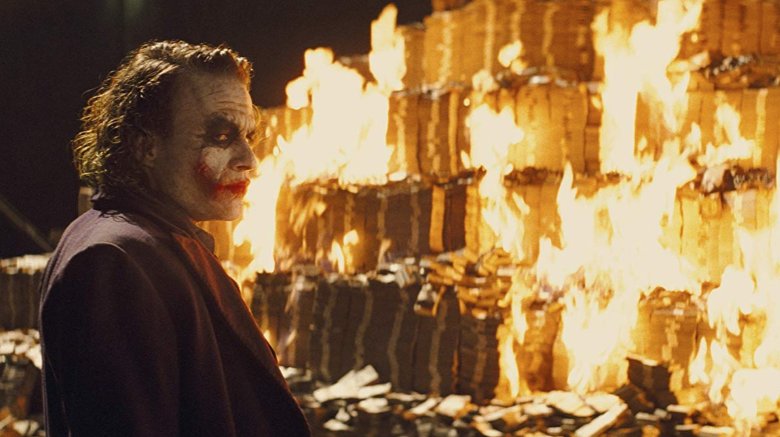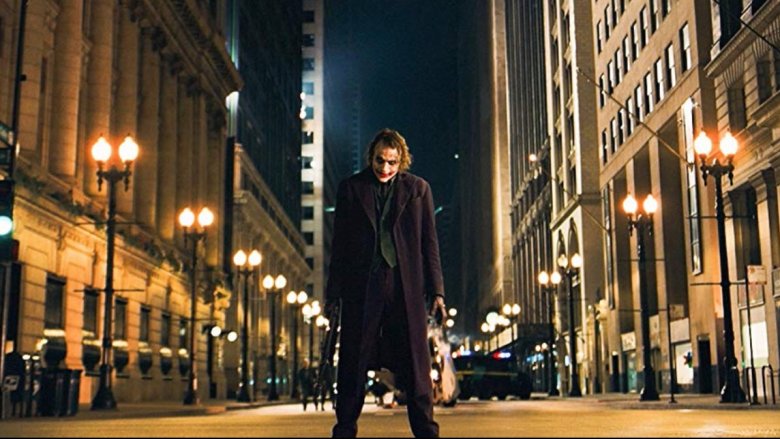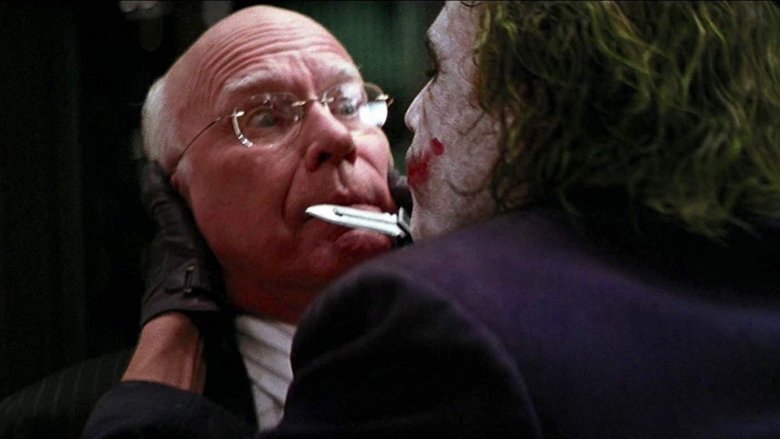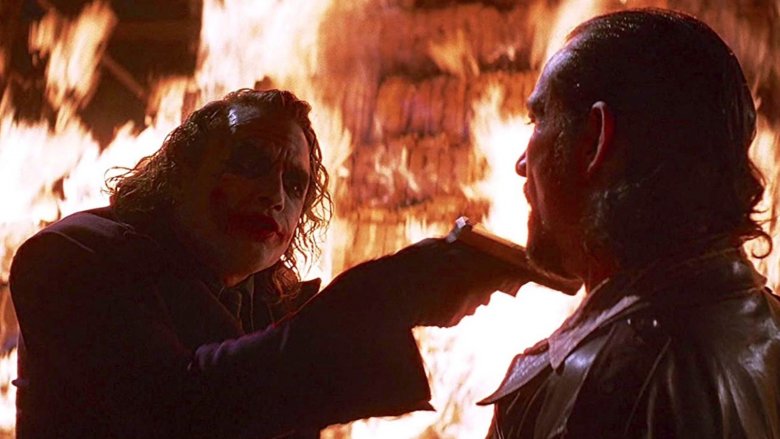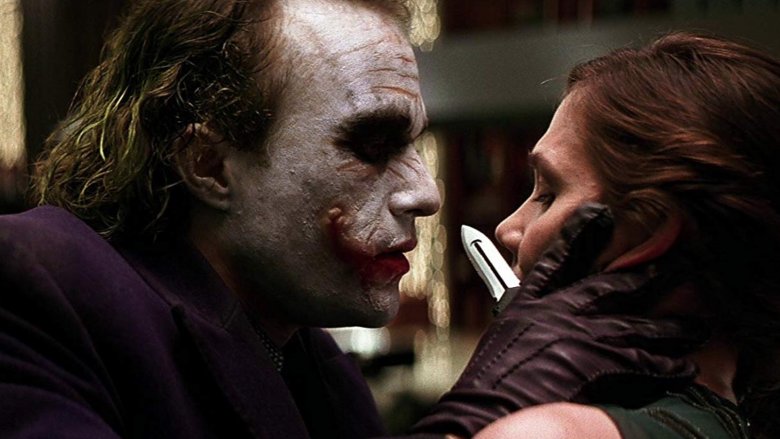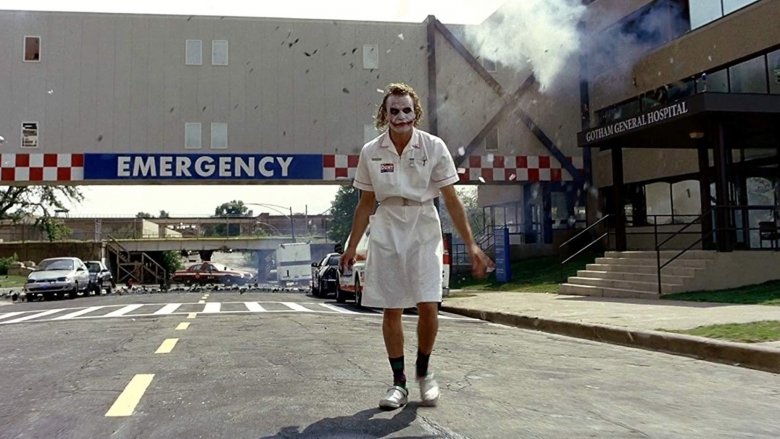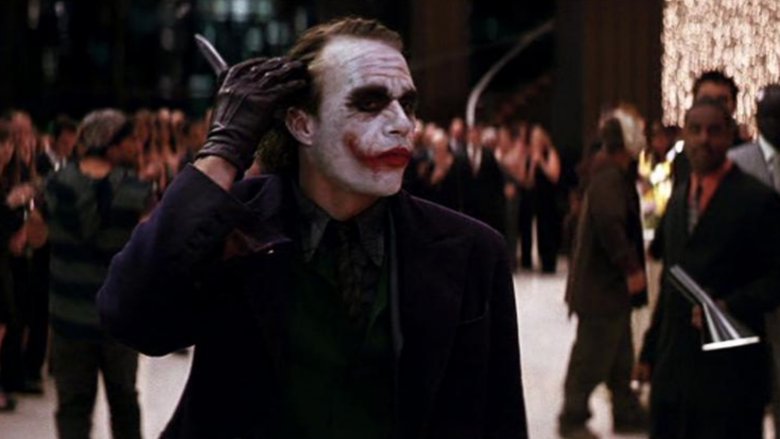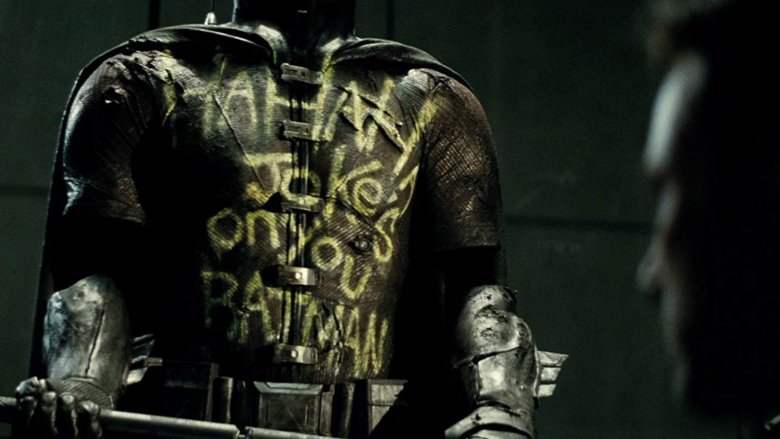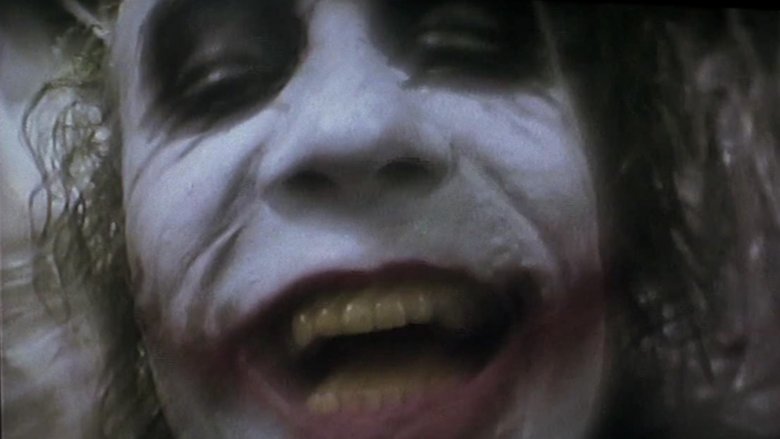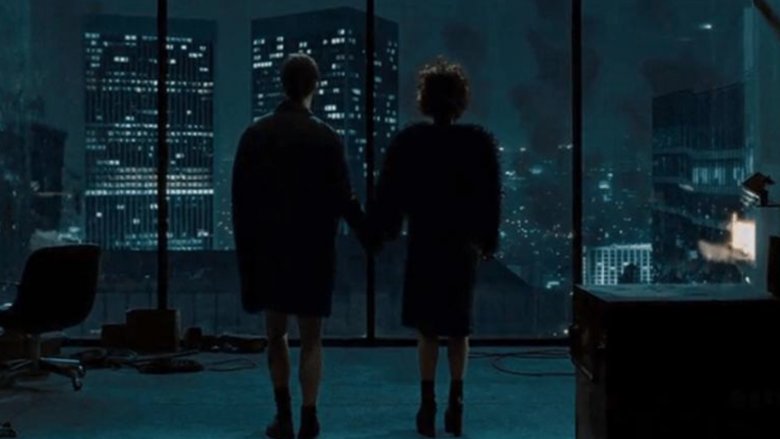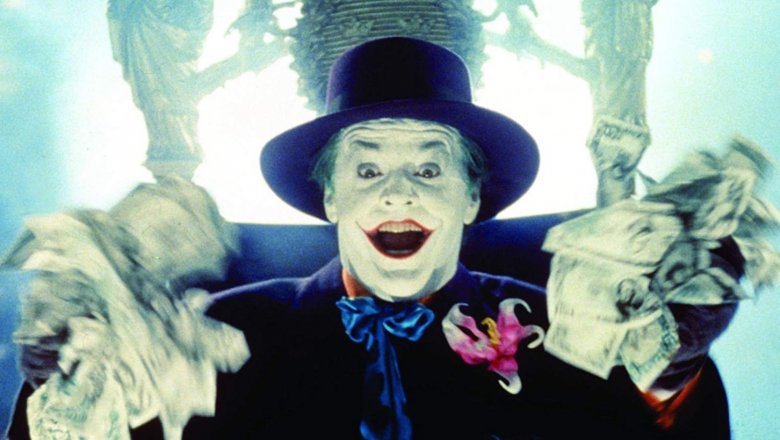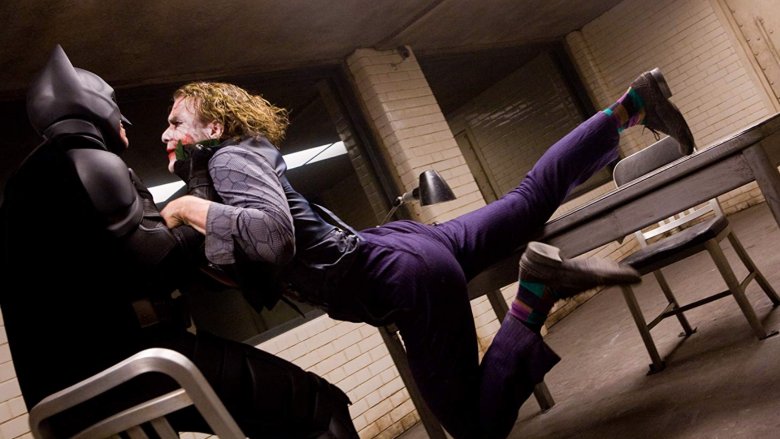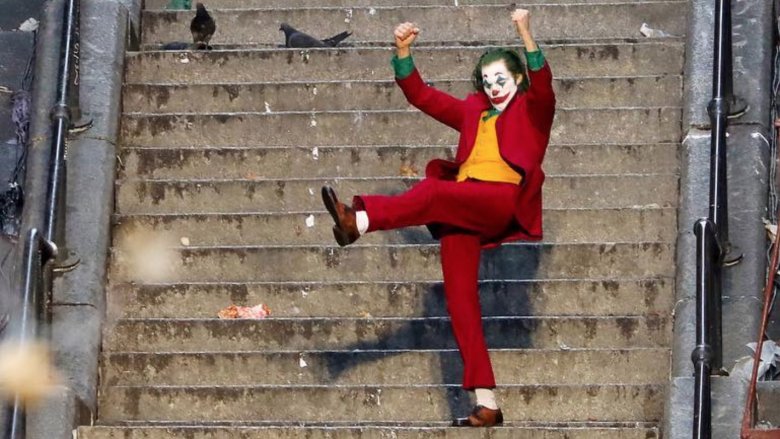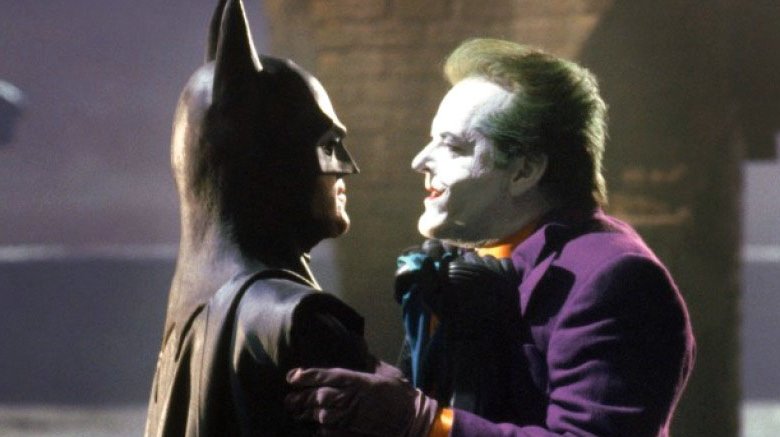Joker Fan Theories That Change Everything
Since his diabolical debut on the pages of Batman #1 nearly 80 years ago, the Joker has become the most ruthless of Batman's rogues gallery, and one of the greatest villains ever. Seriously, as far as bad guys go, only Hannibal Lecter, Satan, and William Atherton have reached the same depths of malevolence.
The Clown Prince of Crime holds a grip on our popular culture almost as tight as the Caped Crusader himself. It's easy to identify the source of Joker's popularity and staying power — the dude simply gives zero you-know-whats. In a culture confined by rules, there's something compelling about a maniacal clown who so gleefully breaks them. No wonder, then, that so many actors have jumped at the chance to play him on screen. The Joker gives movie stars the chance to chew scenery like medium rare filet mignon, from mustachioed TV mainstay Caesar Romero to legendary Hollywood bad boy Jack Nicholson; from Heath Ledger in an Academy Award-winning posthumous performance, to Jared Leto doing whatever it was Jared Leto was doing.
Yet the true power behind each performance (yes, even Leto's) isn't just what each actor did on screen, but the seeds he planted in the fans' imaginations. The only things crazier than the Joker are the fan theories his cinematic escapades have inspired. If you're ready to never watch Batman movies the same way again, check out the Joker fan theories that change everything.
The Joker has PTSD
Most fan theories about the Joker center on Heath Ledger's performance in The Dark Knight. This is no surprise, for a few reasons. Ledger's brilliant work was graced with Oscar gold, The Dark Knight was a milestone event in American popular culture, and Christopher Nolan's ambiguity about Joker's origins invites fans to fill in the blanks.
And fill in the blanks we most certainly have. Because The Dark Knight can be seen as a thinly-veiled commentary on the War on Terror, one of the most popular theories is that the Joker was a Special Forces soldier who snapped, like John Rambo in greasepaint. Given Nolan's deliberately realistic approach, this theory has merit. After all, it's not like this Joker learned about firearms and explosives just from watching the Outdoor Channel. But some fans who believe Joker is a psychopathic ex-soldier have taken this theory to its logical next level — what if the Joker has PTSD?
Such a scenario is troubling, to be honest, because it turns a vicious, mass murdering monster into a sympathetic war hero. Before you dismiss this as pure fan fiction however, consider Bane's class warfare in The Dark Knight Rises, released just after the time of Occupy Wall Street. Is it really it stretch to say that Joker was a war veteran wreaking vengeance on the society that left him to die in the desert?
Patton Oswalt takes this theory to the next level
Comedian Patton Oswalt disagrees with the PTSD idea. While he's best known for his stand-up comedy specials and voice work, Oswalt is also a pretty keen observer of superhero stories. He is an adherent of the "Joker as Special Forces soldier" school of fan theorizing, but has added his own unique twist.
In a lengthy Facebook post published just two months shy of the film's 10th anniversary, Oswalt wrote: "I just re-watched The Dark Knight, and another wrinkle came to mind about the Joker. What if he's not only ex-military, but ex-military intelligence? Specifically — interrogation? He seems to be very good at the kind of mind-f***ery that sustained, professional interrogation requires." Hot take there, Patton. Lots of fans seem to like the way Oswalt thinks. The post has received over 17,000 reactions, and astoundingly all of them are positive (and this is Facebook, where even adorable kitten pictures get downvotes).
While Nolan has never answered the fan theorizing (and likely never will), the "Joker as a Special Forces soldier with PTSD who was also an military interrogator" has given fans plenty to mull over.
The Joker was the hero of The Dark Knight... wait, what?
Now we've heard everything. In a post popular enough to receive some major media coverage, Reddit user generalzee proposed that the Joker was actually the hero of The Dark Knight... at least, as much of a hero as a cold-blooded killer can be. According to this theory, before Joker showed up, Gotham was so infected with organized crime and corrupt officials that the city turned to a masked vigilante to save them. Then, the Redditor writes, "Along comes the Joker and by the end of a very short time, almost all organized crime was eliminated, many corrupt officials were imprisoned or dead, and the city's vigilante even went into hiding... This was all part of Joker's masterfully executed plan."
Well, when you look at it like that, maybe Joker wasn't so bad. But what about the boats? Joker was literally tempting prisoners and pedestrians to blow each other up! Turns out the Redditor has an answer for that too, as the Joker "proved that there was good even in the most supposedly despicable of Gotham's inmates."
That's a pretty generous reading of his motivations. But what is undeniable, as this theory makes clear, is that by the end of The Dark Knight Gotham's criminal underbelly is destroyed. All it took was a few sticks of dynamite, the murder of countless innocents, and a city of millions beset by terror. Gee, Joker... thanks?
From Gotham with Love
Though it's a compelling notion, there are problems with Joker being a soldier suffering from PTSD. Sure, you could argue that the theory is not to be taken literally, and that maybe Joker's mania was simply a metaphor for the disorder. After all, the amount of meticulous planning Joker employs isn't reflective of the realities of PTSD. Filling the void in its place is another wildly imaginative theory — Joker was a spy!
The "Joker was a spy" theory that has been making the rounds is both an evolution of the "Joker was a Special Forces soldier" idea and a refutation of it. What's the evidence? For one, Joker's knowledge of Gotham's power hierarchy demonstrates a background in surveillance. There's also the fact that Joker can withstand — and apply — both physical and psychological torture. And there's the fact that, whether you believe he was a hero or villain, the Joker does want to "save" Gotham by rooting out the city's criminality and corruption.
It's an interesting take. Whether or not you buy it, though, the most fascinating thing about this theory (and a lot of these theories, frankly) is that it shows just how much fans want Joker to be the good guy... albeit in his own homicidal, psychopathic way.
The Joker's in on the joke
Before Deadpool broke the fourth wall and box office records in his self-titled debut, the Joker did the same thing in The Dark Knight, at least according to one popular fan theory.
While Joker breaking the fourth wall is a common occurrence in the comics and in cartoons, he has never done so on the big screen... or has he? Reddit user someonesfreakingout postulated that the Joker in The Dark Knight knows he's in a movie. The Redditor argues that most of Joker's "comedy" is meant not for the characters in the movie, but for a hidden audience: us. This gives the Joker a characteristic rarely associated with him, namely sanity.
"From a certain perspective, this makes Joker the sanest character in the entire series, as he is the only one who realizes that they are all in a movie, playing games for someone else's enjoyment," the theory proposes. "The Joker is a grease-painted Neo... he kills to show that life and death are just jokes for a godlike audience in the constructed fantasy-land they inhabit."
Far out, dude. So maybe Joker should have taken the blue pill instead?
Why Joker didn't kill anyone at Bruce's party
You may notice a theme running through these Joker theories — they all fundamentally change the character's arc, and consequently, the meaning of the movie (we did say these theories would "change everything," after all). But what about a theory that doesn't require any such drastic retconning?
Reddit user DorkKnight52 noticed that the Joker, a big fan of mass murder, doesn't kill anyone at Bruce Wayne's party for Harvey Dent. Why? The Joker arrived at Bruce's party with one goal: to kill Harvey Dent, who he thought was Batman. When Batman arrives and dives out the window to rescue Rachel Dawes, Joker leaves, thinking Harvey/Batman just jumped to his death.
Later in the film, after Harvey claims to be Batman, Gotham's District Attorney is carted off in a paddy wagon with a police escort. We're led to believe this is Batman's plan to lure out the Joker, but what if it was the Joker's plan to lure out Batman? If Batman doesn't show, that means he really is Dent. When Batman does arrive, the Joker's master plan changes — he no longer wants to kill Gotham's white knight, but corrupt him.
"Joker thinks Harvey Dent is Batman" will make your 2,065th viewing of The Dark Knight more interesting, without any of the moral conundrums of "Joker was a hero."
The Clown Prince of Crime was once the Boy Wonder
What if Jared Leto's Joker was actually Jason Todd? This theory has been dancing in fans' minds ever since it was first postulated around the time Batman v. Superman: Dawn of Justice was released. For those not in the know, in the comics Jason Todd was the post-Dick Grayson Robin, until he was beaten and blown up by the Joker (after a deeply disturbing fan vote, giving whole new meaning to Vote or Die).
The DCEU has indicated that Jason Todd's story would be part of the cinematic canon, with the blown-up Boy Wonder's costume (spray painted with the words "Hahaha, joke's on you Batman!") appearing in BvS. But when Jared Leto appeared months later as a much younger (and, let's say, odder) Joker in Suicide Squad, some fans wondered if this Joker could be Jason Todd. While writer/director David Ayer has laughed off this rumor, can your really believe him? After all, Jason and Joker both start with "J," so... there's that.
Frankly, while this theory is interesting, fans probably like it mainly because the alternative is so unappealing — Leto's terrible, tatted-up interpretation of the Joker is the Joker. But would you want Jack Nicholson's or Heath Ledger's Joker to have been a completely different character in disguise? No. Why would anyone think it's a good idea to pull a bait-and-switch with a character's most famous foe? Oh, wait...
Heeeeere's Joker!
Whatever happened to that adorably creepy kid in The Shining? Well, he wound up being the main character in Stephen King's sequel Doctor Sleep. But that came out in 2013, a full five years after The Dark Knight in 2008. What if Danny Torrance grew up to be the Joker? One anonymous meme creator postulated just that, using the first of Joker's many stated origin stories as evidence. Now, we're not seriously arguing that The Dark Knight was meant to be a sequel to The Shining, but maybe Christopher Nolan's interpretation of the character was partially inspired by the 1980 horror classic.
Nolan is a huge fan of Shining director Stanley Kubrick (so much so that he helped restore Kubrick's 2001: A Space Odyssey). And there's precedent, as Jack Nicholson's performance as Jack Torrance did help secure him the role of the Joker in 1989's Batman. Maybe, just maybe, there's a little bit of the Torrance family in the Joker. If so, though, why didn't he ever use his Shining abilities?
First rule of Fight Club: don't talk about the Joker
Technically, this theory isn't from any of the Batman films, but it is so awesomely out there we had to share it. According to Redditor Bakkidza, Fight Club could be read as an origin story for the Joker. David Fincher and Christopher Nolan do share similar aesthetics, so it's interesting to consider.
The theory points out that just like Joker, Edward Norton's Narrator (who — spoiler alert — is also Brad Pitt's Tyler Durden) has a manic personality, a gang of loyal minions, and is an agent of chaos rebelling against the status quo. Oh, he also shoots out his cheek, giving himself a "smile like a dragon of avarice." Who knows? This may have been Joker's last story about how he got his scars, if Batman hadn't interrupted him. The appeal underlying this theory is pretty simple — what could be better than one internet fan-favorite film? Two, of course!
While it's doubtful that author Chuck Palahniuk intended Fight Club to be a Joker origin story, it does go to show just how entrenched certain character tropes become in popular culture, and even mythology. Whether a Trickster or a Jester (or a Joker or a Tyler Durden), the whimsical, maniacal agent of chaos has been with us since our species first started telling stories. Perhaps the human race will always need a laughing madman asking us, "Why so serious?"
The universe needs a Joker? You meta believe it!
This theory doesn't concern one Batman movie, but several of them. The idea is simple: as soon as one Joker is gone, he is replaced by another. If we're being literal, this is the only "theory" that is 100% true — from a business perspective, Warner Bros. does need a new Joker in every incarnation of the Batman franchise. He may be crazy, but the dude is money. While the Joker is necessary from a financial and entertainment perspective in our universe, what if, in some strange meta-textual way, he was also necessary in the DC Universe itself needs a Joker?
Redditor Gatta Post Fast argues this while trying to create a correlation between the Tim Burton/Joel Schumacher Bat-verse and Zack Snyder's. According to this theory, when Jack Nicholson's Joker died, he was eventually replaced by Jared Leto's. Thus, the Burton-Schumacher Batman is the same one as the DCEU Batfleck. Vague sequels and "soft reboots" (in which less popular films from a franchise are ignored or even eliminated) are increasingly the norm in Hollywood. And composer Danny Elfman did score films in both franchises, bringing back the Batman march for Justice League. Could this be a hint that this the DC films all exist in one giant, shared universe?
If so, could Jack Nicholson's Joker come back and slap Jared Leto's Joker silly?
The Joker and Batman are brothers
Perhaps the most exciting theory is the one that has been staring us in the face this whole time: Batman and the Joker are brothers! According to this theory, Thomas and Martha Wayne had another child before Bruce that was born with a mental disorder and was confined to a psychiatric hospital. That child? Thomas Wayne Jr., a.k.a. the Joker!
The comics have danced with this idea for a while now, but fans have argued there are some hints dropped in The Dark Knight, too. Consider the famous interrogation scene, in which Joker goes to great lengths to explain to Batman how he is a "freak" like him. This scene establishes the two as symbolic brothers, but what if it's hinting that they're literal brothers as well? Joker also says that when the people of Gotham don't need Batman anymore, they'll cast him out like a leper. This would be something Joker (who, in this theory, was abandoned to a state psychiatric hospital) would know something about.
"Brothers don't shake hands... brothers gotta hug!" Or physically and psychologically abuse each other in an increasingly outlandish and sadistic game in which the fate of a major city in at stake. Some families are weird.
He's immortal
He looks like the Joker, he acts like the Joker, and the movie's named after the Joker, but according to some fans, Joaquin Phoenix isn't playing the Joker in Joker. At least, not the Joker we all know and love.
For starters, Phoenix is playing a character named Arthur Fleck. While we've heard Joker's name as "Jack Napier" before (most notably in Tim Burton's Batman and Batman: The Animated Series), he's never had a 100% canonical identity, and Arthur Fleck is a new one. Frankly, it sounds like a red herring, or maybe the Joker just started life as a drunken British playboy. Mr. Fleck is also several decades older than the boy who would become Batman. Phoenix is in his 40s, while Dante Pereira-Olson, who has been cast as "Young Bruce Wayne," is very young indeed. This has caused fans to speculate that Phoenix's Arthur Fleck is not the real Joker, but his clownish criminal predecessor who inspires the true Joker years later.
With its constant darkness that provides a cover for an oddly dressed billionaire vigilante to track down a guy in a question-mark-covered one-piece and an umbrella-wielding penguin man, it also wouldn't be completely absurd if the Joker, everybody's favorite crazed criminal clown, turned out to be immortal. But don't take our word for it — this is actually something that's been explored in the comics.
According to Batman #37 (via Newsarama), released in 2014 as part of the "Endgame" arc, the Joker can and will live forever. In the comic, Commissioner Gordon uncovers old newspaper photos depicting the Joker committing crimes in 1910 and 1946. He assumes the Joker doctored the pictures, but after the Joker endures a seemingly fatal gunshot blast, it would seem the trickster is telling the truth. By the end of "Endgame," both Batman and the Joker lay dead... but then maybe the Joker just wants everybody to think he's dead, as that's a mistake Gotham has made before.
Batman imagines the Joker is more important than he is
Tim Burton's 1989 Batman not only heralded a new era in well-made, serious comic book movies, but it also offered a major reimagining of a major part of the Caped Crusader mythos. The event that sent Bruce Wayne on the path to becoming Batman: the night his parents were robbed and killed by an otherwise petty criminal named Joe Chill. In the world of the '89 cinematic Batman, however, the Joker (in his Jack Napier alter ego) is responsible for the ignoble end of Thomas and Martha Wayne. That only increased Bruce Wayne/Batman's loathing of the Joker, which motivated him to stop this criminal menace, and helped elevate the Joker to arch-villain status.
Or, per one fan theory pertaining specifically to Burton's Batman, what if the Joker was the same Joker from most other Batman media, and wasn't the guy who killed the Waynes? Adherents say that since Batman is so obviously mentally and emotionally tortured, he projects blame for the death of his parents onto the Joker because that's the guy he's fighting. The Dark Knight merely planted the Joker/Jack Napier connection into his memory in order to explain his hatred for the guy.
